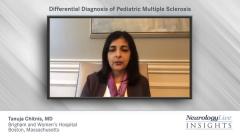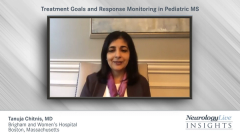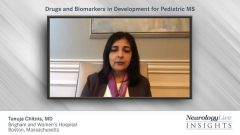
Treatment Goals and Response Monitoring in Pediatric MS
Tanuja Chitnis, MD reviews the 2018 AAN guidelines on disease-modifying therapies and discusses goals of therapy when selecting first-line treatments and monitoring response in pediatric multiple sclerosis.
Episodes in this series

Tanuja Chitnis, MD: The AAN [American Academy of Neurology] 2018 guidelines for multiple sclerosis told us that clinicians had come together and had agreed that it’s very important to ensure that patients are given treatment options at their first visit. Treatment is to be discussed and suggested to be initiated as soon as possible. It’s a complex situation in terms of treatments; there are almost 20 MS [multiple sclerosis] treatments available. This is wonderful, but it makes for a long and complex discussion. The guidelines also laid out that a neurologist should discuss the different treatment options with MS patients and help them to find the best fit. This is for their course of disease, their lifestyle, other comorbidities, and laboratory values that might be factors, then to also consider switching treatments if one is not working. It’s important to also monitor treatment response; I tend to do this with clinical visits every 3 to 6 months in my pediatric patients, as well as MRIs of the brain and spinal cord every 6 to 12 months.
Some of the goals of therapy, especially for pediatric MS, is to find a therapy that a child or a teenager will be willing and feel comfortable to take. Also, their family members should feel comfortable with this; it is a decision that’s made in part with the parents as well as the young person with MS, and their caregiver. It is important to check in and monitor that they’re still comfortable and adhering to the therapy. Adherence is a major factor that we’ve run into with kids with MS. No one likes to take a treatment, and sometimes either very easy or convenient to forget. It is important to think about ways to remind young people to continue to take therapy.
When I first meet a family who’s been affected by pediatric MS, I want them to understand the goals of treatment. It’s very important to lay out that although there is no cure for MS at the moment, we now have a very good way of controlling the sequelae of MS, namely the relapses, both halting them and reducing them in frequency, thereby hopefully preventing longer-term disability. It is very important to think about that as the main goal of treatment. When I meet a family and a young person with MS, I also think about their lifestyle. Are they able to take a pill on a daily basis? Or would they prefer an infusion, which is less frequent? Patient preference, lifestyle, whether they’re a student, or a college student who’s living away from home, might play into this decision as well as their ability to adhere to treatments. There are a number of screening tests that are important to do prior to starting any therapy; it’s very important to screen for some of the viral antibodies, which are either necessary or not necessary for different treatments, and for comorbidities that could affect your ability to take certain treatments.
I follow my pediatric patients fairly closely, especially after a young person has just started a new treatment or is contemplating new treatments. I will have a follow-up visit with them a month after starting treatment, and then every 3 to 4 months thereafter for about a year. Once they’re stable on a therapy and they’re feeling fairly comfortable, and hopefully their symptoms are improving, I might then go to a follow-up visit every 4 to 6 months. Generally, I will also do an MRI every 6 months for at least a year when starting a new treatment to make sure that there are no new lesions that are ensuing, and to also reestablish a baseline MRI after starting a therapy. Then after that, once we’re stable on treatment, I’ll perform an MRI generally every year; that will help to monitor their overall treatment response.
Transcript Edited for Clarity
Newsletter
Keep your finger on the pulse of neurology—subscribe to NeurologyLive for expert interviews, new data, and breakthrough treatment updates.





















